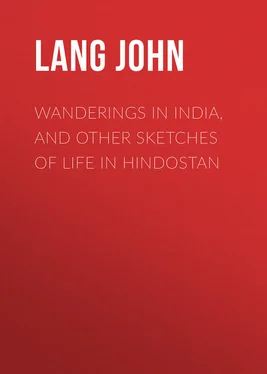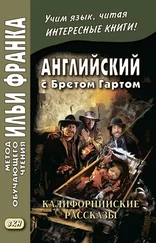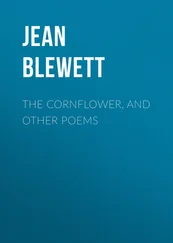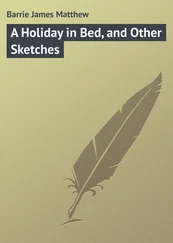These Thugs were permitted to have their families at Monghyr; and one morning when I strolled down to their camp, an old man made five children, the eldest boy not more than eight years old, go through the business of strangling and robbing a victim. In one respect these urchins outdid their progenitors in the acting. They not only went through the ceremony of searching the dead body, but, that done, they dragged it by the legs to a well, and, in dumb show, threw it down, and then uttered a prayer to Heaven.
"Was that good?" said one of the children, running up to me for applause and a reward. I scarcely knew what to reply. Before I had time to give any answer, the child's father said, "No; it was not good. You used the handkerchief before the signal was given. Go through it again, and remember, this time, that you must have patience." The boys began again, much in the same spirit that an actor and actress would go through the strangling scene in "Othello," to please a fastidious manager.
Approaching a very interesting-looking woman, of about two-and-twenty years of age, I said to her, "What do you think of this?"
She replied in a proverb: "The mango always falls beneath the shade of the parent tree."
"But the crime?" said I. "What think you of that?"
She looked up with as lovely a pair of eyes as ever saw the light, smiled, and responded:
"Heaven will hold us all, Sahib!"
I was about to reason with her, but her husband, with an expression of pride, interfered, and informed me that she had taken eighteen lives.
"Twenty-one!" she exclaimed.
"Eighteen only!" said he.
"Twenty-one!" she persisted, and ran them over counting on her fingers the places and the dates when the murders were committed. Her husband then admitted that she was in the right, and, turning to me, remarked:
"She is a very clever woman, Sahib."
"Were your victims men or women?" I said to her.
"All women," she answered me. "Some old and some young."
I was tempted to ask her to show me how it was done; and after considerable coaxing she complied with my wishes. To my surprise she was the only actor in the scene, except the victim, with whom she went through the process of strangling with a piece of cord. The victim, another Thuggess, was supposed to be sleeping when the operation was performed, and I could not help admiring – horrible as the sight was – the accuracy with which she performed the throes and agony of death. To borrow an idea from Junius, "None but those who had frequently witnessed such awful moments could describe them so well."
At the house of my Monghyr friend I met a French gentleman, an indigo-planter of Tirhoot, in Behar. He invited me to pay him a visit, and to accompany him in his boat. He was about to sail on the following day. I say "sail," for at that time (the month of August), the country was inundated, and it would have been impossible to travel by land. I accepted the invitation, and we sailed from Monghyr to Hajeepore without going near the Ganges for several days.
Monsieur Bardon, the French planter, was one of the most accomplished and agreeable men I had ever met, and in truth one of the greatest characters. The hospitality of the Tirhoot planters is proverbial in India, and I believe I might have lived in that Garden of the East, as it is called, from that day to this, as a welcome guest of the various planters, if I had chosen still to be their guest. As it was, I was eight months in the district, and then had very great difficulty in getting away. A now celebrated officer, at that time commanding the Irregular Cavalry at Segowlie, induced me to visit him; and after leaving his abode, I went to the Bettiah Rajah, who initiated me into the mysteries of tiger-shooting. It was in the dominions of this small chief that my hands and face were so browned that I became far less fair than many natives of the country. Before leaving Tirhoot, however, I paid a visit to Rooder Singh, the Rajah of Durbungah, the richest native perhaps in all India. He has two hundred thousand pounds a year net revenue; and in a tank in his palace there is lying, in gold and silver, upwards of a million and a half sterling. Chutter Singh, the father of the Rajah of Durbungah, was a firm friend of the British Government during the Nepal war. He raised a regiment of horse and provisioned it. When asked by the authorities for his bill, he replied that the Government owed him nothing.
Конец ознакомительного фрагмента.
Текст предоставлен ООО «ЛитРес».
Прочитайте эту книгу целиком, купив полную легальную версию на ЛитРес.
Безопасно оплатить книгу можно банковской картой Visa, MasterCard, Maestro, со счета мобильного телефона, с платежного терминала, в салоне МТС или Связной, через PayPal, WebMoney, Яндекс.Деньги, QIWI Кошелек, бонусными картами или другим удобным Вам способом.












